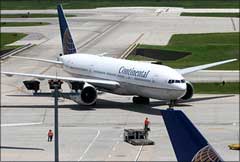 Most of the European nations, including the United Kingdom and Germany, reopened their air space on Wednesday after an unprecedented six-day lockdown due to the Icelandic volcanic ash that stranded tens of thousands of passengers globally and caused airlines a loss of $1.7 billion.
Most of the European nations, including the United Kingdom and Germany, reopened their air space on Wednesday after an unprecedented six-day lockdown due to the Icelandic volcanic ash that stranded tens of thousands of passengers globally and caused airlines a loss of $1.7 billion.
All UK airports reopened under a new deal making airlines to agree to conducting "intensive" ash damage inspections of aircraft before and after each flight. Germany and 18 other EU countries also announced full reopening of their air space.
The International Air Transport Association (IATA) said that airlines lost around $1.7 billion as a result of the shutdown caused by the volcanic ash.
During the weekend, carriers were losing $400 million per day, IATA Giovanni Bisignani said in Berlin, while describing as "conservative" the earlier estimate of $200 million per day.
Europe's air traffic control agency Eurocontrol estimated last night that around 75 per cent of European airspace was now open and only a small air traffic corridor in north-west Europe remained closed.
Eurocontrol said about 50 per cent of Europe's 27,000 daily flights resumed their operation on Tuesday.
A spokesman for the agency said in Brussels he expected the continent's air traffic to normalise in the coming days.
More than 95,000 flights were cancelled across Europe since the flight ban was imposed on Thursday last in the wake of volcanic ash clouds which spread from Iceland to other countries in the continent.
More than 800 flights operated from Germany's main airports on Tuesday before the full reopening of the air space, thanks to special permission given to the airlines to fly a limited number of services.
It required the pilots to fly manually instead of instrumental flights and to keep a level of below 3,000 metres, where the volcanic ash concentration hazardous for aircraft is supposed to be lower.
National carrier Lufthansa, Air Berlin and German Wings and charter operator Condor availed of the special permission to bring back home hundreds of their customers stranded abroad and to ferry passengers stranded in Germany.
Germany's Air Traffic Control Authority DFS, said the special permission was issued to the airlines in response to their request and the pilots had to fly their aircraft relying entirely on their visibility.
The decision to issue special permission for airlines was taken by Germany's Federal Office for Air Safety after test flights by Lufthansa showed that there was no risk in such 'controlled flying' below 3,000 metres.
Britain's Aviation Authority had early on Tuesday extended the flight ban till this morning, but retracted its decision and allowed landings and takeoffs at all airports from last night.
Experts in the UK warned the travel industry faces a "huge logistical operation" as some 150,000 Britons were currently stranded overseas.
The country's Civil Aviation Authority (CAA) announced a "phased reintroduction" of UK airspace from 10pm last night. The deal - which amounts to a rewriting of current rules - involves airlines agreeing to making "intensive" ash damage inspections of aircraft before and after each flight. They must also report any ash-related incidents.
Plane-makers have agreed to higher tolerance levels for aircraft flying through areas of low ash concentrations. The decision was made after manufacturers, airlines, the British government and aviation bodies took account of new data and analysis that suggested flights could operate safely in certain circumstances.
CAA chairwoman Dame Deirdre Hutton said "some no-fly zones" would remain, but these would not affect UK airports. A Downing Street spokesman said Prime Minister Gordon Brown welcomed the decision by the CAA to allow the UK airspace to be used.
British Airways will operate all long haul flights from Heathrow and Gatwick but all short haul flights remain cancelled until 1 pm this afternoon.
No flights have arrived or left Heathrow this morning. Other airlines have warned hundreds of flights remain cancelled and urged passengers to contact them before making their way to airports.
The UK no-fly zone was dramatically lifted last night after a game of brinkmanship by British Airways boss Willie Walsh.
The BA chief executive sent 26 long-haul flights towards British airports and demanded that the air authorities allow them to land.
At first the planes heading towards Heathrow and Gatwick were turned away but last night Britain's Civil Aviation Authority and air traffic control body NATS caved in and finally ended the flying ban.
Criticising authorities for closure of the airports leading the airlines to lose 200 million pounds a day, Walsh said last evening: "I don't believe it was necessary to impose a blanket ban on all UK airspace last Thursday. My personal belief is that we could have safely continued operating for a period of time."







 © 2025
© 2025